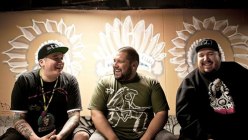What’s alluring about the group’s music is the way the trio — Bear Witness, DJ Shub and DJ NDN — utterly transforms familiar Native American sounds. The song “Electric Pow Wow Drum” is — as its name suggests — a wild, pulse-driven reinterpretation of the traditional Native American pow wow that brings together tribespeople. “Woodcarver,” about a Native American woodcarver shot to death by Seattle police in 2010, uses media reports of the killing to recreates the shooting itself with Native American chants in the background. And “General Generations” locks the voice of an older Native American man to the sounds of electronic beats. The songs practically demand you to move your feet while simultaneously investigating your own understanding of Native American culture.

A Tribe Called Red is made up of (left to right) DJ NDN, DJ Shub, and Bear Witness. Photo by Pat Bolduc.
At some of the A Tribe Called Red’s shows, non-Native fans have shown up with traditional Native American headdresses and “war paint,” thinking they’re paying homage to the culture that the DJs are celebrating. But Bear Witness discourages that sort of fan-identification because, he says, it trivializes the culture.
“It’s a common thing where people think, ‘Oh, I’m going to honor you, ‘” he says. “We had a show last month in Montreal where I counted at least six or seven headdresses in the audience. At a show in Toronto, people came in war paint, but after that show, a conversation started on Facebook when photos of the show came out. Both sides (people defending the war paint, and those against it) got pretty nasty. But what came out of the whole discussion eventually was a few of the people who did show up in war paint realizing that they had done something wrong, and apologizing, and saying, ‘Thank you for setting me straight.'”
Occasionally, A Tribe Called Red will have to answer to Native American elders who object to the venues the group plays. “The only real reaction we’ve gotten from people in a negative sense is from people who aren’t necessarily comfortable with us using ‘pow wow’ in a situation where alcohol is being served,” he says. “But at the same time, people who’ve expressed a concern around that have always followed up with, ‘I really like what you’re doing.’ We’re walking a fine line with what we’re doing, and it takes a lot of care, so that people from our community are comfortable with what we’re doing.”
A Tribe Called Red takes inspiration from Redbone, which in the early 1970s was the first Native American rock group to get international recognition. “Come and Get Your Love,” Redbone’s most popular hit, had no recognizable Native American elements to it — at least on the radio — but the group’s concerts were another matter, with Redbone wearing Native American clothing and adding Native American rituals to the song. Redbone’s other music was downright political — as in “We Were All Wounded at Wounded Knee,” where the lyrics announced, “We were all wounded at Wounded Knee, you and me, in the name of Manifest Destiny,” and, “We’ll sing, sing, sing our story until the truth is heard. There’s a whole new generation. Braves who dream of veneration who were not wiped out by the 7th Cavalry.”
Bear Witness, who’s 35, is part of a new generation of Native North Americans who say they’re trying to broaden the connections between their culture and the culture at large. You can see this broadening in the annual Native American Music Awards, which gives honors in such categories as “Best Blues Recording,” “Best Pop Recording,” “Best Rap/Hip-Hop Recording,” and “Best Pow Wow Recording.” This year’s Native American Music Awards is May 10. Just by getting on stage and playing music that attracts a wide audience, A Tribe Called Red is extending the boundaries of what can be called “Native American music.” Bear Witness grew up in an activist household, and he initially got into DJing as a teenager to escape an environment where nearly everything — from discussions at home to lessons at his school — was premised on how to take the Native American movement higher.
“I wanted to get away from that feeing of having to be political all the time,” says Bear Witness. “But that’s what comes with being Aboriginal. I tried to rebel against it, but the more I did, the more I found myself in this place where I had to be political. Just being Aboriginal is being political. That fact that I wake up in the morning and do anything is political, because of everything in this world that’s been done to stop my culture. So, the fact I know my culture, and that I know my history, and that I’m living and thriving — it starts from a political thing. It’s a responsibility, but it’s a responsibility that you can’t get away from. To be an Aboriginal artist, and to be in the public eye, you automatically have to talk about political things because that’s the understanding you have to create as an artist. If I’m just talking to my own people, well, yes, I don’t have to be political. But as soon as I’m outside my community, I have to talk about those issues. I have to talk about the world that we live in.”



